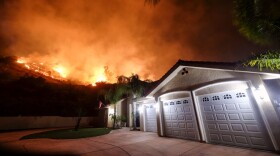As a government shutdown was averted last week, lawmakers approved funding for a program aimed at providing cancer research for children but the pared-down funding measure excluded a program aimed at helping people in our region afford cancer treatments due to their exposure to radiation associated with the government's nuclear program.
The Radiation Exposure Compensation Act (RECA) was inadequate from its inception in the 1990s because it limited coverage areas to counties within states, including Arizona, Nevada, New Mexico and Utah. For example, people in Clark County, Nev., were covered but just across the state line, people in Mojave County, Ariz., were not. This ultimately left many who could have qualified for cancer care without it, said Kyle Ann Sebastian with the Union of Concerned Scientists.
As if radiation stopped at county lines, “counties seem to have been arbitrarily excluded despite evidence suggesting they have been exposed to comparable levels of radiation,” said Sebastian.
With new technology, supportive lawmakers have introduced studies showing that radiation waste has affected the health of communities in eastern states like Missouri and as far away as Guam.
Funding programs ranging from disaster assistance to children’s cancer research are all important but “Congress can’t seem to come together to pass aid for those folks,” said Sebastian.
This summer, RECA was allowed to expire, as some Republicans balked at the cost of funding it. But others called for an expansion of coverage — and for the government to take responsibility, since the radiation exposure was linked to government nuclear weapons programs. Advocates say an expanded program could help hundreds of thousands more affected by radiation exposure.
Sebastian is hopeful the Republican majority in 2025 will back expanding the program, adding the expanded version was voted on and received bipartisan support in the Senate twice.
Advocates will essentially have to start all over. And, perhaps the next mostly Republican Congress will now introduce “an expanded version of the bill as a standalone measure,” said Sebastian.
When RECA was allowed to expire in summer 2024, it was the first time in some 30 years that any program was not available to help victims of radiation exposure.
This story was produced by the Mountain West News Bureau, a collaboration between Wyoming Public Media, Nevada Public Radio (KNPR) in Las Vegas, Boise State Public Radio in Idaho, KUNR in Nevada, KUNC in Colorado and KANW in New Mexico, with support from affiliate stations across the region. Funding for the Mountain West News Bureau is provided in part by the Corporation for Public Broadcasting.








